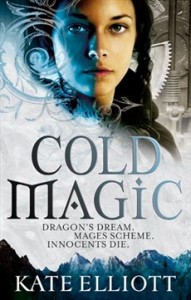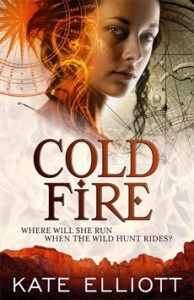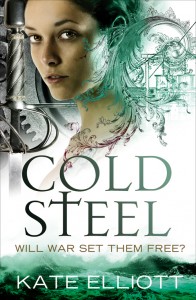Kate Elliott on the Spiritwalker Trilogy
 For the Spiritwalker project I wanted to write a multicultural world in which a mixing of cultures and people was the expected, the norm. I happen to think that when cultural change is considered across time, mixing is the norm. It is going on all the time throughout history. Interaction and influence are what keep cultures dynamic. A closed, static culture is a dying culture. In addition, these processes are not one-way. Cultural change happens in many directions, some of them exploitative and coerced and others subtle, subversive, and unexpected.
For the Spiritwalker project I wanted to write a multicultural world in which a mixing of cultures and people was the expected, the norm. I happen to think that when cultural change is considered across time, mixing is the norm. It is going on all the time throughout history. Interaction and influence are what keep cultures dynamic. A closed, static culture is a dying culture. In addition, these processes are not one-way. Cultural change happens in many directions, some of them exploitative and coerced and others subtle, subversive, and unexpected.
Certainly living in Hawaii since 2002 has influenced my choices in this regard. My earlier Crossroads Trilogy is influenced by although not specifically based on the Asia-Pacific cultural mix of Hawaii. COLD MAGIC (US | UK | AUS) and the other Spiritwalker books do not use any specific local-to-Hawaii cultural influences; however, they do incorporate ways in which I perceive that local culture has found to keep the cultural integrity of varying cultural groups (not always easily, and certainly the Native Hawaiian culture has fought a tremendous battle against colonization and erasure) allowing a unique syncretic local culture to arise that incorporates elements from all the different ethnic and cultural groups that co-exist here.
 In Spiritwalker the cultural mixing is a bit different but the process is similar: an immigrant Malian culture meets and mingles with northwestern Celtic Europe while old imperial Rome and merchant Phoenicia retain a strong influence, just to name the four most prominent cultural groups in the book (the second novel, COLD FIRE (US | UK | AUS), adds the Taino culture of the Caribbean to the mix). I admit that I wanted to highlight the immense and too-often overlooked power and richness of the West African Mande traditions and civilizations, specifically the Malian Empire. Western media and narratives too often and too easily dismiss sub-Saharan Africa (as if it is all one thing) with a few words: famine, civil war, guns, blood diamonds, slavery, and so on, and in doing so miss, denigrate and outright disappear the significant history and culture that was present historically not to mention the actual life and culture and history-in-the-making that is there right now. The history and culture of Mali is not my story to tell but I did feel I had a story to write about how we TELL history.
In Spiritwalker the cultural mixing is a bit different but the process is similar: an immigrant Malian culture meets and mingles with northwestern Celtic Europe while old imperial Rome and merchant Phoenicia retain a strong influence, just to name the four most prominent cultural groups in the book (the second novel, COLD FIRE (US | UK | AUS), adds the Taino culture of the Caribbean to the mix). I admit that I wanted to highlight the immense and too-often overlooked power and richness of the West African Mande traditions and civilizations, specifically the Malian Empire. Western media and narratives too often and too easily dismiss sub-Saharan Africa (as if it is all one thing) with a few words: famine, civil war, guns, blood diamonds, slavery, and so on, and in doing so miss, denigrate and outright disappear the significant history and culture that was present historically not to mention the actual life and culture and history-in-the-making that is there right now. The history and culture of Mali is not my story to tell but I did feel I had a story to write about how we TELL history.
I grew up in the USA, on the Mainland, in a school system that taught history as if it was almost exclusively about the Western world and specifically the European and American experience. This history took brief detours into the “ancient glory'” of China and India-because-the-British-Empire-was- there (with a glimpse of Japan because of Admiral Perry and World War II). As well, while the version of American history we were taught did include mention of the Native American population that was here when the Europeans arrived, its narrative focused on the doomed and tragic figure of the proud and noble (but often savage, so we were reminded) American Indian exemplified in the famous and possibly apocryphal “I will fight no more forever” speech of (the very real) Chief Joseph of the Nez Pearce.
 Yet the history I was taught in school and in many of the books I read was an extremely narrow and blinkered view of the far vaster and more complex lives human beings have actually lived, even though it was treated at that time in my school system and culture as if the centrality of the West were the only possible view, the only possible outcome in the teleology of history.
Yet the history I was taught in school and in many of the books I read was an extremely narrow and blinkered view of the far vaster and more complex lives human beings have actually lived, even though it was treated at that time in my school system and culture as if the centrality of the West were the only possible view, the only possible outcome in the teleology of history.
When I began writing Cold Magic, and thus the Spiritwalker Trilogy, my primary goal was to tell a story that would be exciting and rich, a page-turner that was difficult to put down. I wanted to tell a story in which the central emotional relationship was a female friendship (sisterhood). I wanted a story in which the concerns of a young woman finding her way in the world could include sword fighting, sewing, finding enough to eat, sex, science, revolution, spying, and fashion. I wanted her voice to carry the tale. I wanted to write a fantasy novel in which the neutral universal stance — the one that expresses the story’s highest level of privilege that no one thinks about in the Spiritwalker world because it is the default expectation — is embodied in a man of African ancestry. And I wanted to write about lawyer dinosaurs.
One of the other things I wanted to do was to try to move outside common assumptions about the weight of “the West” by which I specifically mean the early modern and modern era colonial powers in world history. I wanted to create a world in which a mix of cultural traditions have created a dynamic changing world that looks similar in many ways to our own but different as well. In other words, I hoped to make the point, deep under the surface story, that modernity is not dependent on the existence of “the West” as we know it. Technology and science and industry, rights and revolution: These things are one way (although not the only way) to define modernity, and they belong not to any one regional place but to the human condition.
I wanted to write about what I always seem to write about: the change and evolution of cultures. Because cultural change has been going on since the dawn of humanity. And it is going on, right now, around us all.
